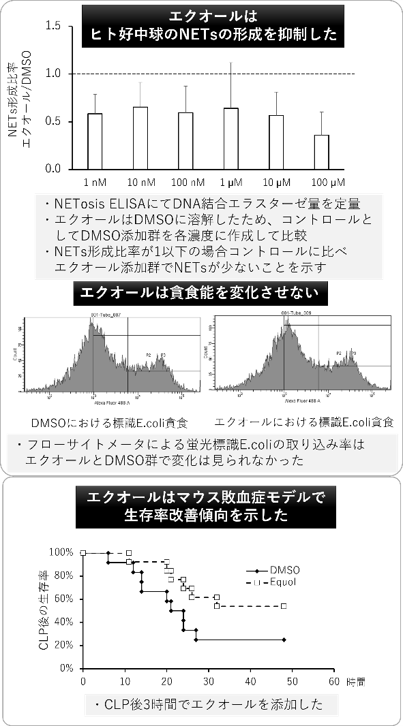Equol regulates the function of overactivated neutrophils during sepsis
情報更新日 2025年12月26日
- Seeds Information
- Researcher Information
- What do you expect from collaboration with companies?
- Contact for this research
Seeds Information
keyword
sepsis, innate immunity, neutrophils, neutrophil extracellular traps, female hormones
Field
Emergency and Intensive Care Medicine
Overview
There are gender differences in sepsis prognosis, with male hormones worsening the prognosis and female hormones improving the prognosis. On the other hand, one of the neutrophil functions that contributes to septic organ damage and disseminated intravascular coagulation (DIC) is the overproduction of neutrophil extracellular traps (NETs), and there are reports that NETs formation is involved in the aggravation of recent COVID-19 pneumonia.
We have demonstrated that equol, a female hormone analogue, suppresses NETs in human neutrophils while maintaining neutrophil phagocytic function. Equol is a female hormone analogue derived from soybeans, is relatively inexpensive to produce, and is easily metabolized. In addition, its female hormone-like effects are smaller than those of estradiol, so it is considered to be very safe in terms of side effects.
What's new?
Focusing on gender differences in sepsis prognosis and applying equol, a female hormone analogue, to sepsis treatment
What are its advantages over other studies?
While hyperactivation of neutrophils (increase in NETs) can contribute to the worsening of pathological conditions, such as organ damage and increased thrombosis, neutrophils are essential cells for infection defense, and prolonged inhibition of their function may be detrimental to the pathological condition.
For this reason, equol, which is easily metabolized and relatively inexpensive to produce as it is derived from soybeans, may be useful as a method of preventing worsening prognosis in acute disease states, not as a drug that produces a rapid effect, but rather to maintain a baseline for improvement of the pathological condition.
What problem does it help solve?
Not only in sepsis, but also in autoimmune diseases and COVID-19 pneumonia, the involvement of an increase in NETs due to excessive immunity has been suggested.
We have obtained data showing that equol reduces the growth of NETs, which is expected to lead to the resolution of the above issues.
Possibility of other applications and developments
―
Related Patents
―
Related papers
- Hiromoto Murakami, Michiko Ishikawa, Hideki Higashi, Keisuke Kohama, Taketo Inoue, Noritomo Fujisaki, Jun-Ichi Hirata. Equol, a soybean metabolite with estrogen-like functions, decreases lipopolysaccharide-induced human neutrophil extracellular traps in vitro.SHOCK. 2024, 61(5), 695-704.
- Michiko Ishikawa, Hiromoto Murakami, Hideki Higashi, Taketo Inoue, Noritomo Fujisaki, Keisuke Kohama. Sex Differences of Neutrophil Extracellular Traps on Lipopolysaccharide-Stimulated Human Neutrophils. Surgical Infections. 2024, 25(7), 505-512.
- Michiko Ishikawa, Hayato Yamashita, Nobuki Oka, Takahiro Ueda, Keisuke Kohama, Atsunori Nakao, Joji Kotani. Antithrombin III improved neutrophil extracellular traps in lung after the onset of endotoxemia. JOURNAL OF SURGICAL RESEARCH. 2017. 208. 140-150
- Michiko Aoyama, Joji Kotani, Makoto Usami. GENDER DIFFERENCE IN GRANULOCYTE DYNAMICS AND APOPTOSIS AND THE ROLE OF IL-18 DURING ENDOTOXIN-INDUCED SYSTEMIC INFLAMMATION. SHOCK. 2009. 32. 4. 401-409
- 石川 倫子, 村上 博基, 小濱 圭祐, 桑原 正篤, 平田 淳一, 小谷 穣治. 【凝固と炎症のクロストーク】抗凝固療法によるNETs抑制. ICUとCCU. 2021. 45. 6. 351-355
Researcher Information
| full name | Michiko Ishikawa |
|---|---|
| Affiliation | School of Medicine Emergency and Intensive Care Medicine |
| Specialization | Emergency and Intensive Care Medicine |
| Collaborative Researcher | Keisuke Kohama, Hiroki Murakami, and Taketo Inoue |
| Related links | Course introduction website |
What do you expect from collaboration with companies?
In collaboration with pharmaceutical companies, we would like to develop equol, which has already been developed as a food product, into an infusion.
- We believe that adding equol to infusions as needed during the acute phase may prevent excessive activation of neutrophil function, protect the vascular endothelium, and suppress organ damage.
- In addition, NETs have been reported to be associated not only with sepsis, but also with autoimmune diseases and COVID-19 pneumonia. It is conceivable that equol could be used to treat these diseases involving excessive immunity.
Contact for this research
兵庫医科大学 大学事務部 研究推進課
E-mail: chizai@hyo-med.ac.jp
Tel: 0798-45-6488

 Research Seeds Collection
Research Seeds Collection
